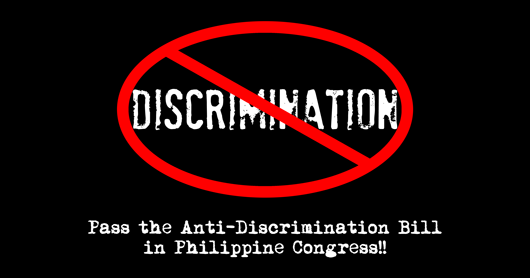Take Action: Urge Philippines Congress to #StopTheDiscrimination!
02/09/2015
The Issue
For more than a decade, the Philippines Congress has delayed taking action on the enactment of a comprehensive anti-discrimination bill. Now, a broad coalition of Filipino activists is urging Congress to take action and Stop the Discrimination!
Congress is currently considering numerous draft bills aimed at stopping discriminatory policies and practices in schools, places of employment, commercial establishments, hospitals and health care facilities, the civil service, police and military.
What YOU Can Do
Join IGLHRC and the multi-sectoral coalition of marginalized groups in the Philippines in our campaign “Stop The Discrimination”, urging the Philippines Congress to protect lesbian, gay, bisexual, transgender (LGBT) people, indigenous peoples, persons with disability, persons living with HIV, religious minorities, young people and old people from discrimination and exclusion.
Sign our petition! Urge the Philippines House of Representatives and Senate to Stop The Discrimination by passing a Comprehensive Anti-Discrimination Law!
Background
In August 2014, a multisectoral coalition was formed to lobby for the passage of a Comprehensive Anti-Discrimination Bill that enshrines protections for LGBT people, indigenous peoples (IPs), persons with disability (PWDs), persons living with HIV, religious minorities, young people and the elderly. This coalition was the result of several on-going dialogues between leaders from marginalized groups, initiated by the International Gay and Lesbian Human Rights Commission (IGLHRC) and the Commission on Human Rights (CHR).
Despite the equality and fairness guaranteed by the Philippines Constitution, the lived experience oƒ stigma, intolerance, violence, abuse and discrimination of the different marginalized groups show that the Philippines government does not meet the standards set by the Constitution and universally recognized human rights.
- LGBT persons are denied work, bullied and harassed in schools. At present there is an increasing number of transgender women being murdered.
- Indigenous persons are denied work and are denied access to educational scholarships because of how they look, how they talk, and other differences.
- Persons with disabilities are denied employment regardless of their professional qualifications and skills, and face physical and communication barriers of accessibility to facilities, activities and services open to the public.
- Old persons are denied employment because of the assumptions of inferior work quality. They are also denied services by lending agencies.
- People living with HIV continue to face stigma and discrimination that prevent them from accessing services and engaging with health providers so that HIV programs can benefit them.
- Young people are denied employment because of their age, and health programs and services are not inclusive of the sexual and reproductive health needs of youth.
The Philippines Constitution guarantees the right to dignity and respect for human rights (Article 2, Section 11,) and obligates the State to ensure fundamental equality of women and men before the law (Article 2, Section 14). The Philippines has ratified seven international treaties and agreed to abide by the Universal Declaration on Human Rights.
The anti-discrimination bills that have been filed in the House of Representatives and Senate provide a mechanism to address discriminatory polices and practices against marginalized groups across different sectors of Philippines society by instilling protection in schools, offices, commercial establishments, health care institutions, the civil service, police and military.
As part of the campaign of the multi sectoral coalition, this letter-writing campaign seeks to increase support for the passage of a comprehensive anti-discrimination legislation by the Philippines Congress.







